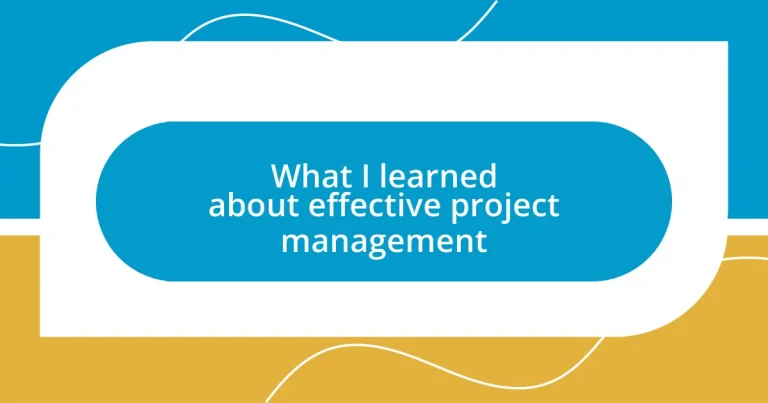Key takeaways:
- Effective project management involves breaking down tasks, engaging team members, and ensuring clear communication with stakeholders to foster a collaborative atmosphere.
- Key skills for project managers include communication, adaptability, and leadership, which promote transparency, resilience, and creative problem-solving.
- Setting SMART goals and utilizing the right tools and frameworks, like Agile and collaborative software, enhance project clarity, accountability, and team motivation.
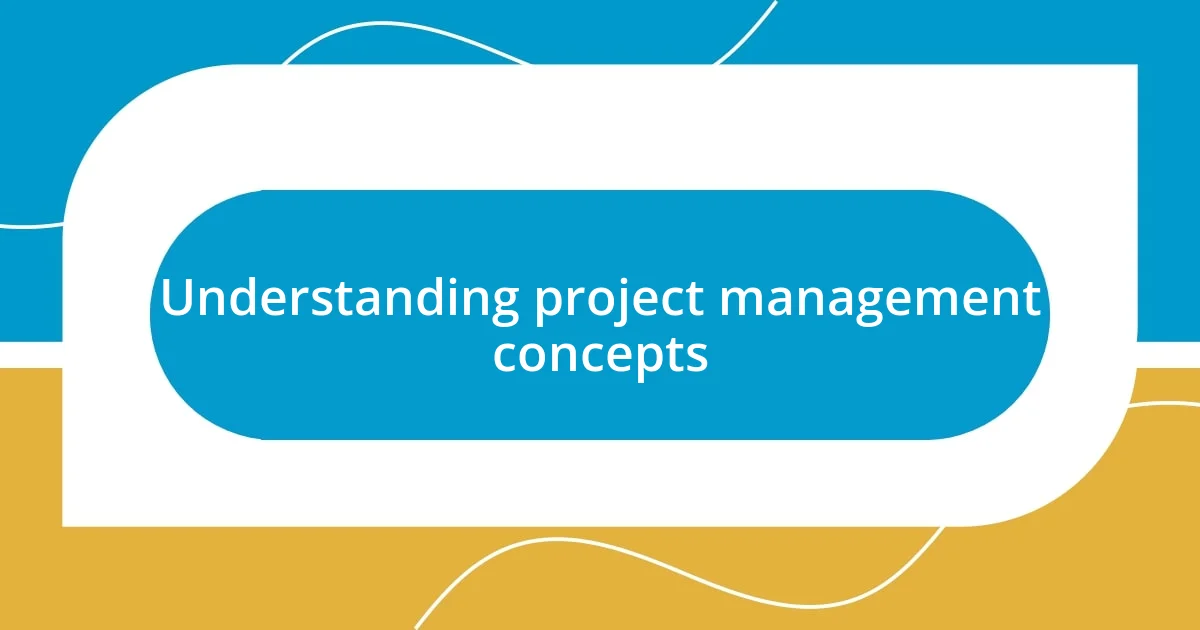
Understanding project management concepts
Understanding project management concepts fundamentally shifts how I approach challenges. I remember a time when I tackled a project that seemed impossible at first. By breaking it down into smaller tasks and setting clear deadlines, I realized that effective project management isn’t just about keeping track of tasks; it’s about navigating complexity with clarity and purpose.
Every project is an adventure, and understanding these concepts helps me enjoy the ride. I often ask myself: What are the project’s goals, and how do they align with the team’s strengths? When I began including my team in the planning process, I noticed their motivations skyrocketed. Engaging everyone allows for a shared vision, making obstacles feel like mere stepping stones rather than insurmountable walls.
One of the most enlightening moments for me was discovering the significance of stakeholder communication. I once overlooked communicating progress with a key stakeholder, which led to misunderstandings. This experience taught me that every stakeholder has their own expectations and concerns; understanding their perspectives is crucial for project success and fosters a collaborative atmosphere, ensuring that everyone is not just on the same page but excited to be there.
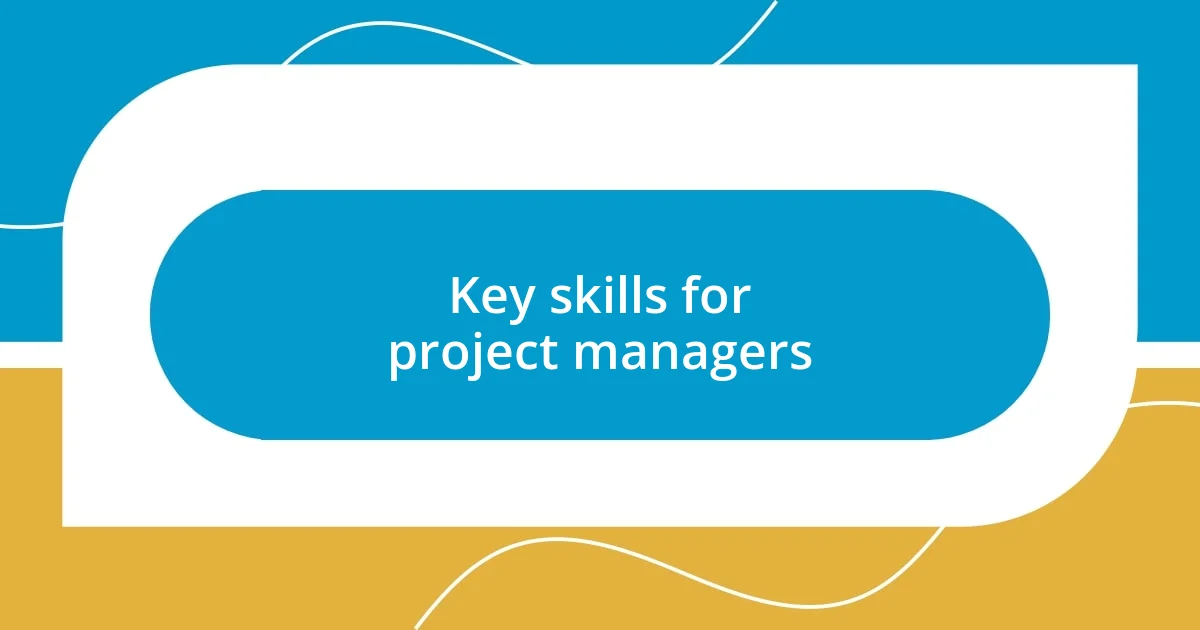
Key skills for project managers
To excel in project management, a variety of key skills are essential. For instance, communication stands out as a fundamental skill. In my own experience, I found that when I clearly communicate expectations and updates, it creates a sense of transparency within the team. I recall a project where open lines of communication prevented a potential disaster due to conflicting priorities. It transformed our workflow and built a rapport that made tackling challenges together seamless.
Another vital skill is adaptability. The project landscape is ever-changing, and I’ve faced situations where unexpected issues arose. During one particular project, a key resource became unavailable at the last minute. By quickly reassessing our options and reassigning tasks, I learned that flexibility can turn potential setbacks into opportunities for innovation. This adaptability not only keeps the project on track, but it also fosters a culture of resilience within the team.
Lastly, I can’t emphasize enough the importance of leadership. Being a project manager means guiding your team through uncertainty. I vividly remember a time when we hit a roadblock in a project timeline. Instead of pointing fingers, I encouraged a brainstorming session where every idea was considered. This approach not only boosted team morale but also led us to a creative solution that ultimately strengthened our project outcome.
| Key Skill | Description |
|---|---|
| Communication | Fosters transparency and builds team rapport. |
| Adaptability | Allows for quick reassessment and innovative solutions. |
| Leadership | Guides the team through challenges and encourages collaborative problem-solving. |
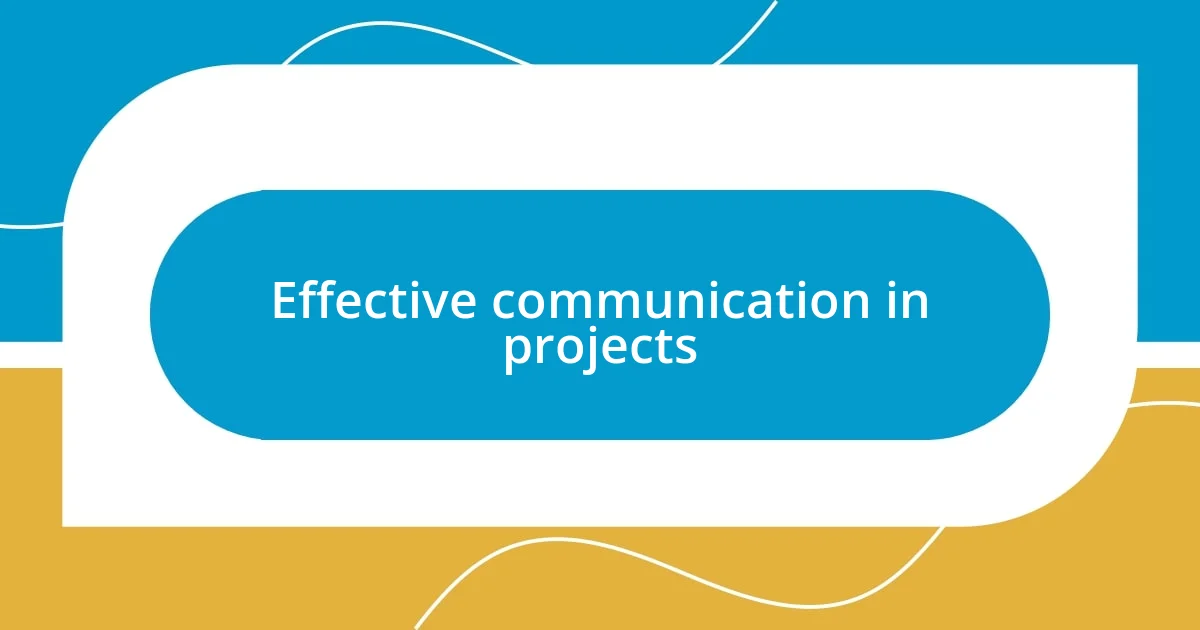
Effective communication in projects
Effective communication is the backbone of any successful project. I learned that when I took the time to foster open dialogue within my team, it transformed the dynamic. There was this one project where I initiated weekly check-ins. Not only did it keep everyone informed, but it also allowed team members to voice concerns and share insights. This practice created a supportive environment and made everyone feel valued and involved.
- Clarity: Ensure everyone understands their roles and responsibilities.
- Feedback Loop: Encourage team members to share their thoughts and suggestions regularly.
- Active Listening: Pay attention to the team’s input and acknowledge their contributions.
In another experience, I realized how vital clear communication is when working with clients. There was a moment when a miscommunication regarding project timelines caused significant stress. By promptly addressing the issue and being transparent about the situation, I was able to rebuild trust with the client. I learned that honesty and proactive communication keep everyone aligned and can even strengthen relationships, making future collaborations smoother.
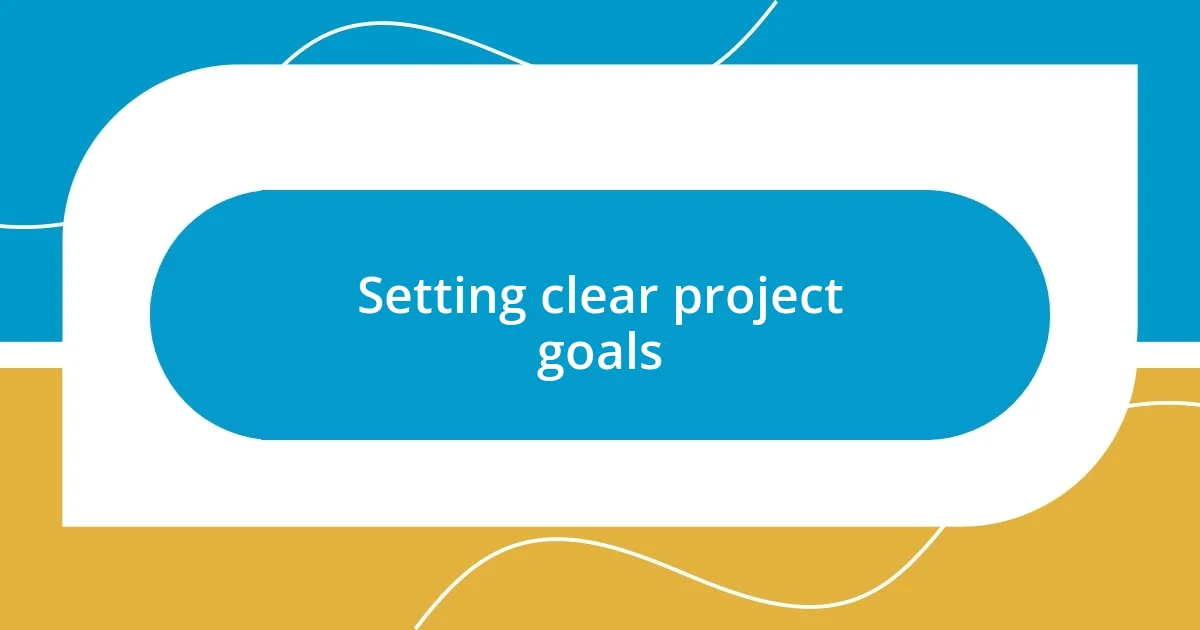
Setting clear project goals
One of the most valuable lessons I’ve learned in project management is the necessity of setting clear project goals. I still remember a project where we jumped in without defined objectives, and it quickly became chaotic. It made me wonder: how can you hit a target if you don’t even know where it is? This experience taught me that well-defined goals serve as a roadmap, guiding the team’s efforts and aligning our collective focus.
In another scenario, I facilitated a team workshop to refine our project goals, and the transformation was remarkable. Each team member contributed their insights, which not only clarified our direction but also fostered a sense of ownership over the project. Seeing everyone’s enthusiasm made me realize that when individuals feel connected to the goals, they are more likely to invest themselves fully in achieving them. Isn’t it inspiring to think that a simple shift in goal-setting approach can elevate team motivation?
Moreover, I advocate for making those goals SMART—Specific, Measurable, Achievable, Relevant, and Time-bound. This framework has been a game-changer for me. I recall a project where setting a specific timeline with measurable milestones kept us accountable and propelled our progress. With each milestone achieved, the team celebrated small victories, which created a lasting sense of achievement and reinforced our momentum. By breaking down our goals into tangible steps, I found that we not only stayed on track but also enjoyed the journey together.
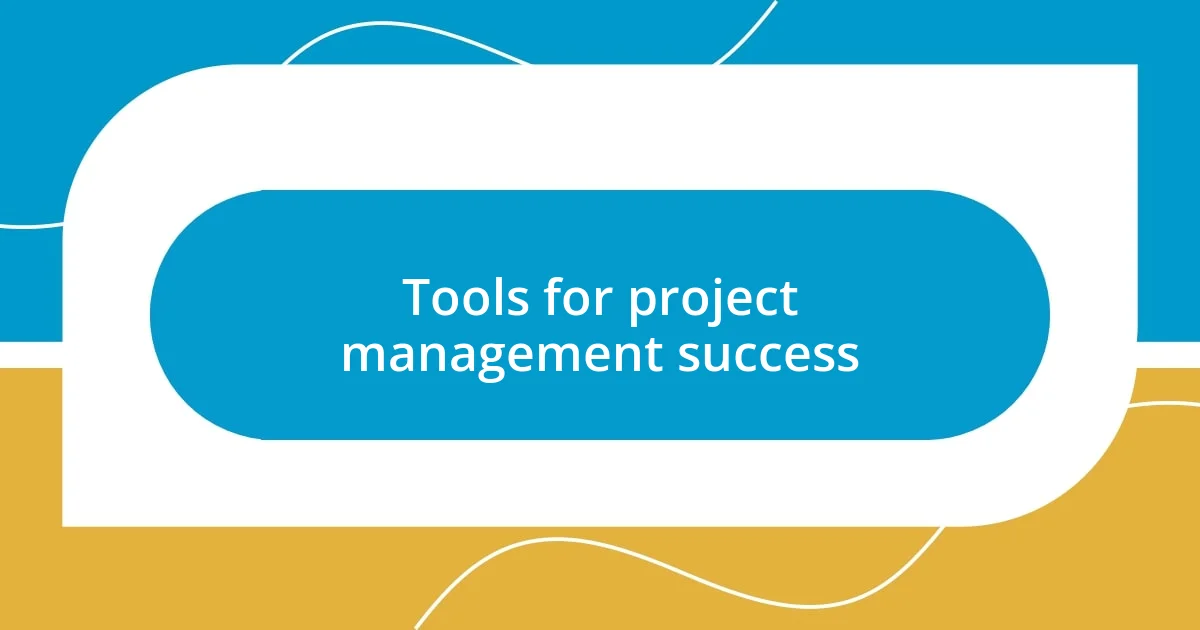
Tools for project management success
When it comes to project management tools, I’ve found that choosing the right software can significantly impact the project’s success. For me, using a collaborative tool like Trello turned my approach on its head. I remember feeling overwhelmed with tasks piling up. But once I started visualizing the workflow on Trello’s boards, things transformed. It made it so much easier to see what needed attention and who was responsible for each task. Have you ever felt lost in a sea of tasks? That visualization truly made all the difference.
Another tool I’ve become a fan of is Slack for team communication. In one project, I set up dedicated channels for different aspects of the project, such as updates, feedback, and brainstorming. This kept discussions organized and reduced the chances of important messages getting buried. I still recall a tense moment when last-minute changes were required, and being able to quickly reach out to my team via Slack made it feel manageable. The ease of sharing documents and updates instantly helped us adapt without feeling overwhelmed.
I can’t overlook the importance of project management frameworks like Agile. In my experience, adopting Agile principles transformed how my team approached projects. Initially, we struggled with long development cycles. But by implementing short sprints and regular retrospectives, we not only increased our efficiency but also cultivated a culture of continuous improvement. It felt empowering to adapt quickly to feedback. Have you tried Agile with your teams? The ability to pivot based on what you learn during each sprint can be a game-changer!
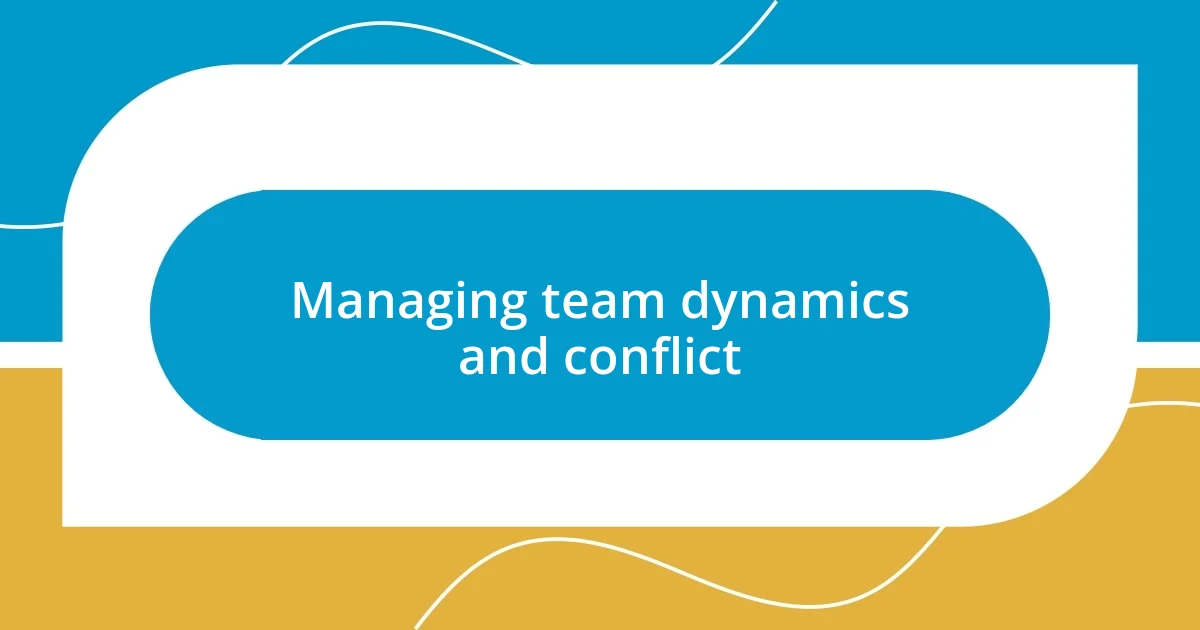
Managing team dynamics and conflict
Managing team dynamics is essential for a project’s success. I vividly recall a time when two key team members clashed over conflicting ideas. Instead of allowing tension to escalate, I invited them to share their perspectives in a safe space. This dialogue not only cleared the air but also led to a creative solution that neither had initially considered. Isn’t it fascinating how open communication can transform conflict into collaboration?
Conflict is inevitable, but how we handle it sets the tone for the entire team. In one instance, I noticed a group member becoming increasingly withdrawn during meetings. Rather than letting this affect team morale, I took the initiative to check in with them one-on-one. It turned out they felt overwhelmed by the pace of the project. By addressing their concerns, I was able to re-engage them and foster a more inclusive environment. It shed light on the importance of being proactive in recognizing the underlying issues that can disrupt team harmony.
I’ve also learned that encouraging a culture of feedback can significantly reduce conflict. During a project retrospective, we created an anonymous feedback mechanism. Surprisingly, it allowed team members to express their thoughts candidly, leading to valuable insights. One suggestion led us to adjust our communication styles, which improved collaboration. Have you ever considered how invaluable honest feedback can be? That experience taught me that openness not only resolves conflict but can also enhance team dynamics overall.












